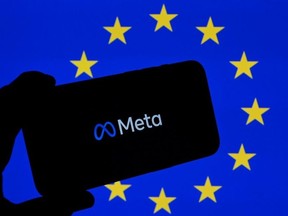
Contents of the article
Brussels (Belgium) (AFP) – The EU on Friday accused Meta and TikTok of violating the bloc's rules on digital content, putting the companies at risk of hefty fines.
Advertisement 2
Contents of the article
The European Union has a strong legal arsenal that requires big tech companies to prevent the spread of illegal content and keep digital markets open to competition.
Contents of the article
Contents of the article
On Friday, the European Commission said Facebook and Instagram's Meta platforms, as well as TikTok, violated the Digital Services Act (DSA), an EU content moderation law that has been criticized by US President Donald Trump's administration.
This is the first time the mission has accused Meta of violating the DSA, which the US giant has denied.
While the announcement includes TikTok, owned by China's ByteDance, it risks angering Trump, who has threatened to impose new tariffs on countries with rules aimed at “harming” American technology.
Despite his threats, the EU said it would enforce its rules.
Contents of the article
Advertisement 3
Contents of the article
In its preliminary finding, Brussels said Meta and TikTok failed to provide researchers with “adequate access to publicly available data.”
EU regulators insist the rules are not just about transparency, but also about ensuring researchers can do important work, such as understanding how children are exposed to dangerous content on popular platforms.
TikTok insisted it was “committed to transparency.”
“We are reviewing the European Commission’s findings, but demands to simplify data protection put the DSA and GDPR in direct conflict,” a TikTok spokesperson said, referring to the bloc’s important data protection rules.
“Where it is not possible to fully meet both requirements, we urge regulators to provide clarity on how these obligations should be reconciled,” the spokesperson said.
Advertisement 4
Contents of the article
– Risk of fines –
The EU also said Facebook and Instagram's Meta platforms do not provide user-friendly mechanisms for identifying illegal content and do not provide their users with effective systems to challenge content moderation decisions.
Regulators have accused Facebook and Instagram of alleged fraudulent practices known as “dark patterns” when it comes to their Notification and Action mechanisms.
“Such practices can be confusing and intimidating,” the commission said.
The DSA stipulates that platforms must explain content moderation decisions, something Facebook and Instagram do not do, the EU said.
Meta said: “We do not accept any suggestion that we have breached the DSA” and continued negotiations with the EU.
Advertisement 5
Contents of the article
“In the European Union, we have made changes to our content reporting options, appeals process and data access tools since the DSA came into effect and are confident that these decisions comply with legal requirements,” the company said in a statement.
– “Protecting freedom of speech” –
Meta and TikTok will now be able to access EU files and propose commitments aimed at addressing Brussels' concerns.
If Brussels does not agree with the giants' proposals, it could impose fines on companies for each violation on each platform.
EU digital chief Thomas Regnier on Friday pushed back against accusations, particularly from the US, that the DSA is a censorship tool.
“When we are accused of censorship, we argue that the DSA does the exact opposite. It protects free speech by allowing citizens in the EU to fight back against unilateral content moderation decisions made by big tech companies,” he said.
Both Meta and TikTok are under investigation in several EU investigations, including one over concerns they are not doing enough to combat the addictive nature of their platforms for children.
Contents of the article






